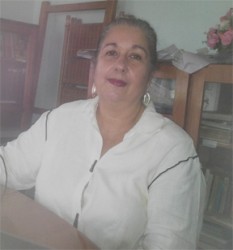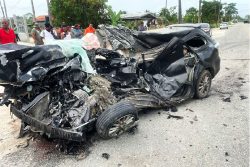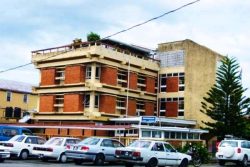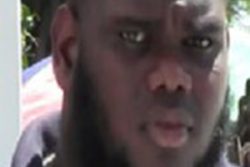A dislike for injustice is what led to Danuta Radzik becoming a women’s activist, and after more than 30 years in the field she cannot turn a blind eye to people abusing power especially in relation to persons who are vulnerable.
“As a woman I just felt the need that there was and is so much work to be done to improve the status of women in all areas [because if] women are empowered they can be the best they are, that there are opportunities for them and that they be free of violence, discrimination and intimidation…” Radzik said in a recent interview with the Sunday Stabroek.
In the interview Radzik spoke about her years in politics, where she sees Guyana politics today and more particularly about women and children’s issues. For the majority of women in Guyana gender equality, access to jobs, services and justice, according to Radzik, are still very limited. The same applies to men and children, she added.

One of the points she made during the interview was that Guyana has a history of introducing legislation to protect the rights of women but if it is not implemented effectively then women will be unable to fully exercise their rights under the law.
“I still think in Guyana when we look at access to justice…for those people in Guyana who are poor and marginalized they do not enjoy the same access to justice as those who are rich…” Radzik said.
Poor people charged with an offence who are not guilty find it almost impossible to find justice, the activist said. As a result poor women do not enjoy the benefits of the law often because if the persons who dispense justice in the judiciary are not sufficiently educated on the laws relating to gender issues, then justice would not be served. Sometimes these persons also bring their own biases when deciding cases, and she said examples of these have been seen even though Chancellor Carl Singh has been attempting to have training done with the magistrates on the Domestic Violence Act.
But she said similar training is not being done on the Sexual Offences Act, and she singled out the now infamous case of deceased former commissioner Henry Greene who had challenged the Director of Public Prosecution (DPP) Shalimar Ali-Hack’s recommendation to have the police charge him with rape. That challenge was led before acting Chief Justice Ian Chang who had gone through the evidence the DPP had at her disposal and in the end quashed her decision to advise that he be charged.
She said it was clear in Justice Chang’s decision that he did not acknowledge some provisions catered for within the Sexual Offences Act.
And while there is strong legislation on paper, Radzik said there is still the need to address sexual harassment, which needs a lot of attention because a great deal of discrimination including sexual discrimination is occurring. She said sexual harassment continues at workplaces and victims are not sure what to do and how to address it.
For changes to be implemented in many areas including gender equality and sexual violence Radzik said there is need for multi-stakeholder forums where knowledgeable people, service providers, ministries and churches oversee a national policy and plan of action, and it should not matter if there is a change of administration because “it would be a national programme of Guyana that has to go forward.”
And she asked where we are headed “if we as a people can’t agree on the best thing for our population on basic things like services, and targeting and eliminating violence…if we can’t agree on that and pool the resources together…”
She questioned what the point is of “everybody in their corner doing something and every few mornings [the various ministries] coming up with some bright idea and a lot of money is thrown at it, [then] you don’t hear anything about it until the next one comes up.” She reiterated that the issues are not being dealt with in a comprehensive and fundamental manner. There are people who can get the work done but Radzik said that party politics has to be thrown out and helping the people of Guyana has to become the priority as the inequality in Guyana is growing.
“There is a greater and greater divide happening; all the corruption, all the money laundering, all the drugs all of those illegal activities which have taken root in Guyana are a very difficult thing to uproot.”
How it started
While Radzik said she does not know “where it [her activism] comes from,” listening to her one realizes that it germinated in her home where she had a very independent mother who understood her worth and was a career women, and a father who treated his wife equally and was always helpful around the house.
The fact that the two daughters of that couple (Danuta and her sister Vanda) both grew up to be women and children’s rights activists (Vanda also works in the field of the environment) reveals that the process started in the home.
She recalled that even at school (she attended school in Barbados) she attempted to represent children whom she felt were being taken advantage of by teachers and other persons in authority, and she “got into quite a lot of trouble for that.” Being exposed to the suffering of children she met during her social work projects for school also played a part in the direction her life took. For her those years “created a social conscience” in her.
“My mother was a very strong assertive lady, had her opinion and voiced her opinion and she also ran a business…I grew up in a household where my mother was empowered and she was free to go out on her own…and my father would never once mention he did not like what she wore or what she said or that she should do this in the home… So he was a very progressive man and liberated man and so I grew up with that and you know this is your father and you figure that is how men should behave…”
Apart from being “progressive and liberated” Danuta recalled that her father was also a very helpful person to many people he met in his area of work, and she recalled being regaled about all her father did for the various persons she happened to meet while a child and a young adult.
Radzik always had an interest in working with women who face violence, and together with a group of women started to work specifically on domestic violence through a national women’s rights campaign which helped to raise the profile and awareness of the issue in Guyana.
Born out of the campaign was the
setting up of a part time counselling centre for victims of domestic violence and the lawyers who were involved in that campaign drafted the Domestic Violence Act and presented it to the then Minister of Labour, Human Services & Social Security. The draft act fuelled some regional workshops followed by some consultations and eventually it became the Domestic Violence Act of 1996. The lawyers who played an integral role at the time were Roxanne George (now Justice George), Rosemary Benjamin and Josephine Whitehead, among others.
Help & Shelter
Radzik is a founder member of Help & Shelter and she said this organisation was born out of a need which arose from the setting up of the Georgetown Legal Aid Clinic. She said after the clinic was set up it was noted that many of the women who were in need of legal help were victims of domestic violence who were also in need of counselling. But because the clinic was not set up to do counselling it was decided that there should be a mechanism in place to facilitate this and this led to the founding of the organisation. Initially, its premises consisted of a small room that was used at the clinic, and all work was voluntary, but not before the women had undergone an intensive counselling training programme. And Help & Shelter continued to conduct training on a yearly basis after they moved to their present location on Homestretch Avenue. Radzik left the organisation for some time but returned in 2007 and has been there ever since.
Like some of the better-known women activists Radzik’s work in this area emerged from the Working People’s Alliance (WPO), of which she was a member, and she had also once been a part of Red Thread. It was after being a political activist for some time that she and others, including her sister Vanda Radzik, Jocelyn Dow, Bonita Harris, Diane Matthews, Andaiye and Karen De Souza (De Souza and Andaiye are the only founder members who remain with the organisation), formed Red Thread. The organization started out working in four communities and was very deliberate in working across the racial divide but choosing villages that were predominantly Afro-Guyanese or Indo-Guyanese.
Speaking about her years in politics Radzik said the first political meeting she attended was when the late Walter Rodney spoke, and that she had never been in “the presence of someone who exerted such power in terms of what they were saying…it was the truth of what he was saying that impacted you.”
“That was certainly an experience that I could never forget and it made an impact on me and I appreciated and I liked the politics that I could have seen of the WPA – multi-racial unity of working people. At that time Guyana was not democratic, it was a divided society and it still continues to be a divided society unfortunately…”
And those who were involved with the WPA back then were “quite remarkable people” and for her the alliance did a great deal of work in breaking down barriers and working towards democracy and ensuring the rights of persons.
Asked about how she sees politics today, Radzik said that it is a “difficult question,” but after a long pause ventured to say that the country needs national unity and a system which can incorporate the talents and the contributions of all Guyanese people on an equal basis.
“I don’t think our political system then and now has moved that much forward…we have free and fair elections but these free and fair elections are still very much premised on ethnicity and race and voting patterns which reproduce themselves in communities and families and among ethnic groups…” Radzik said.
She said that the country is not moving forward as mechanisms need to be put in place where all are equal and have the same rights as are provided for under the constitution. Ways also have to be found to bring about a kind of national unity, and while she agrees that this is easier said than done it is necessary to “break out of these camps which people get locked into because it is doing none of us any good.”
While Guyanese work very well together and socialize freely the real issue comes when party politics comes into play, and this is what divides the nation. During election times this is accelerated and get much more pronounced.
Radzik is the mother of a teenage son and she said that on her passport ‘artist’ is listed as her profession. However, her activism means that this part of her has now taken a back seat and can be considered an “abandoned child.” Nevertheless, she loves the visual arts and fabric art but she seldom gets time for these even though she still does them from time to time. She said the creative people in Guyana are valuable people who should be used to get the messages across to the nation.








